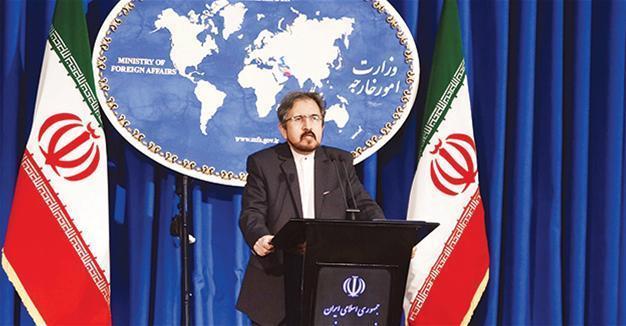Turkey, Iran in spat on eve of Syria talks
ANKARA

Relations between Turkey and Iran have become strained following an exchange of words between the two neighbors, just days before a new round of Syria peace talks are expected to start in Geneva.
Turkey’s Foreign Ministry denounced a statement from an Iranian Foreign Ministry spokesman, who called on Turkey to not “test Iran’s patience.”
“It is neither acceptable nor comprehensible for a country, which does not even hesitate to push to the battlefield refugees seeking shelter from crises, accuses others of being responsible for regional tensions and instability,” Turkish Foreign Ministry spokesman Hüseyin Müftüoğlu said in a written statement on Feb. 20.
“Iran should take constructive steps and review its regional policies instead of putting the blame on countries which criticize it,” he stated, adding that Iran has attracted complaints on international platforms.
His remarks came after Bahram Qassemi, the Iranian Foreign Ministry spokesman, said Turkey “should not test Iran’s patience.”
“Those who have immature dreams about rebuilding an empire and have taken meddlesome, illegal and illegitimate measures and supported terrorist groups cannot shirk their responsibility for such moves through a blame game,” Qassemi said in a statement late Feb. 19, as quoted by Iran’s Tasnim News Agency.
“They should be aware that insecurity and instability in the region has no perpetrator other than them and some other paranoid states,” he added.
Qassemi referred to Turkish Foreign Minister Mevlüt Çavuşoğlu’s speech at the Munich Security Conference in Germany, where he called on Iran to stop conducting a sectarian policy for the sake of maintaining regional stability and security.
“Iran wants to turn Syria and Iraq Shiite,” Çavuşoğlu told delegates at the security conference, adding that Turkey was against sectarianism in the Middle East and had called on Iran to stop threatening the region’s stability.
In addition, President Recep Tayyip Erdoğan said Feb. 14, during a visit to Bahrain that Iran was pursuing “Persian nationalism” in the region.
Turkish Prime Minister Binali Yıldırım also warned Iran on Feb. 19 about highlighting sectarian division in Syria, saying this could cause problems in Turkey-Iran relations, while also terming Iran as a historic neighbor of Turkey.
Iran on Feb. 20 summoned the Turkish ambassador in Tehran, Rıza Hakan Tekin, over comments made by Çavuşoğlu, Erdoğan and Yıldırım.
But on Feb. 20, Turkish Deputy Prime Minister and government spokesman Numan Kurtulmuş struck a more conciliatory tone, downplaying any reports of tension.
“Iran and Turkey are friendly nations. There can be differences in views from time to time, but there can’t be animosity because of comments,” he told reporters during a news conference after a cabinet meeting.
“Even if our political differences with Iran emerge, these shouldn’t be blown out of proportion,” he said.
Turkish Prime Minister Binali Yıldırım on Feb. 18 met with U.S. Vice President Mike Pence on the margins of the Munich Security Conference, for the first high level meeting between the two countries after Trump took office.
“Both leaders agreed that they would not allow Iran to undermine stability in the region,” readout from the White House stated. However, a press note provided by the Turkish Prime Ministry did not mention any topic regarding Iran.
Turkey and Iran along with Russia have been the sponsors of a series of meetings in Astana, the Kazakh capital, in January and February, where the warring sides of the Syrian war, the Syrian regime and the oppositions forces, came together to find a solution to the ongoing conflict.
Though a cease-fire reached between Turkey and Russia on Dec. 30, 2016, has been holding across Syria, the Syrian regime has escalated its fighting in the northern parts of Damascus in the past few days.
UN alarmed over regime shelling in Damascus
The United Nations on Feb. 20 expressed alarm over the escalating fighting in the Damascus area as the world body prepared to launch a new round of peace talks in Geneva on Feb. 23.
U.N. officials have received reports of civilian deaths and injuries from shelling in Qabun, Barzeh, Tishreen and the western Harasta districts of the city, said U.N. spokesman Farhan Haq.
“The U.N. is alarmed by the intensification of fighting in the Damascus area in recent days,” said Haq.
Over 100,000 civilians in need live in those neighborhoods which have seen an upsurge in fighting since Feb. 18, he added.
U.N. envoy Staffan de Mistura was in Geneva awaiting the arrival of delegations to peace talks set to begin on Fev. 23.
The U.N. spokesman indicated that there were still questions concerning the delegations.
“We do expect clarifications on who precisely will be coming over,” he said.
The Syria peace talks are based on the broad mandate of a U.N. resolution that asks the U.N. mediator to hold talks on a “political transition process,” an official involved in the talks said on Feb. 21.
Last week the United Nations appeared to back away from using the phrase “political transition,” which is understood by the opposition to mean a removal of Syrian President Bashar al-Assad or at least an erosion of his powers.
Michael Contet, chief of staff for de Mistura, told a regular U.N. briefing that de Mistura was putting the final touches to arrangements for the talks.
“The invitations as well as the substantive agenda for the negotiations are all based on the wide scope of Security Council resolutions, in particular [U.N. Security Council Resolution] 2254, which is our main guidance in this process. The second operative paragraph of 2254 requests the special envoy to convene formal negotiations on the political transition process,” Contet said.
 Relations between Turkey and Iran have become strained following an exchange of words between the two neighbors, just days before a new round of Syria peace talks are expected to start in Geneva.
Relations between Turkey and Iran have become strained following an exchange of words between the two neighbors, just days before a new round of Syria peace talks are expected to start in Geneva.